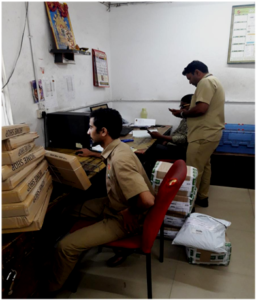A day in the life of a Post Man.
Mr. Gopalakrishnan N, aka Gopi, arrives at the post office by 8 am. His first task is to segregate the mail into Registered Money Order and Speed Post. After this, he bundles his quota, jumps onto his Hero Splendor and starts delivering the mail.
Gopi is a busy man. His phone is ringing off the hook during the interview and he doesn’t dare decline any call. He answers them all, in quick succession, taking breaks in between to respond to my mundane questions.
He says that nowadays, with a dearth in greeting cards and letters, there are more advertisements and bills in the mail; they are often labelled as junk mail. Presenting a sheet with addresses printed on them, he substantiates the influence of technology which involves scanning a bar code to retrieve and store data, saving him from the drudgery of doing it manually.
Gopi says that he covers almost 8 km every day. He starts his delivery at Tulsi-Raman Road, rides through street after street, sometimes delivering letters to his sister-in-law; finally returning to the office at 3:30 pm. After this, he must submit the undelivered money orders to the cashier and the rest to the concerned clerk. He leaves office at 4 pm.
Strikes are not uncommon at the Post Office, sporadically stirred by the Trade Unions. He mentions one which took place in the first week of June this year. Here, the postmen protested because they had not yet received their seventh pay commission.

The minimum qualification to be a postman/postwoman is the completion of the SSLC examination. The honour of being a postman, Gopi says, is attained after five years of service, when one clears the exam and becomes a Postal Assistant. But, he says becoming a Post Master is a longer process, taking 25 years of service. Nevertheless, he is content being on the payroll of the Post Office and continuing service as a friendly neighbourhood postman.
There are thirteen other postmen who share this work at the Frazer Town Post Office located on MM road. Gopi says that women in the service usually walk and deliver mail. They’re seen at the office clearing out old packages, sweeping, and occasionally helping with the assemblage of mail.
However, there is one thing that makes Gopi different from the rest of them. He doesn’t wear a uniform.

Mr. Peter Chains, who turns 94 this August, has received mails from Gopi on a regular basis. Being an old timer, Mr. Chains (affectionately called Grandpa Peter) loves writing letters to his children who are in the US.
He also writes to a beloved friend – Mrs. Mae Amundson who lives in LA. Grandpa has grown awfully close to her over the past decade. His wife mocks him for ‘having a mistress’ behind her back. Grandpa recently wrote to her on the 13th of May, wishing her for completing 99 years.
He complains that the chocolates sent by his daughter from the US are never delivered to him, and blames it on the fraudulent practices of these postmen (Gopi in particular). Grandpa feels that Gopi puts up a facade of being posh, and that’s why avoids wearing a uniform.
When I raise this with Gopi, I cannot stop giggling. “Sir the other postmen wear a uniform. Why don’t you?”
He didn’t see that coming. His face contorted and he tried to dodge the question.
So I began wondering aloud.
“So it’s not compulsory?”
“It is compulsory…but…” , he said shyly, his nose twitching.
I dug deeper, “So it’s fine if you don’t wear one?”
“Huh, yeah.. they…ok”, he stammered.
Mark Sequeira
Latest posts by Mark Sequeira (see all)
- Untold histories paint poor pictures - 13th February 2020
- Where are they now? When was the last time you had a Post Man bringing you letters? - 10th July 2018
- An Interview with Mr Fareed Ahmed of Mecca Book House - 11th January 2018





